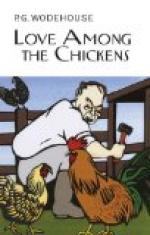I was in the middle of it, very hot, tired, and dirty, when from the other side I heard a sudden shout of “Mark over! Bird to the right!” and the next moment I found myself emerging with a black face and tottering knees on the gravel path of a private garden. Beyond the path was a croquet lawn, and on this lawn I perceived, as through a glass darkly, three figures. The mist cleared from my eyes, and I recognised two of them.
One was the middle-aged Irishman who had travelled down with us in the train. The other was his blue-eyed daughter.
The third member of the party was a man, a stranger to me. By some miracle of adroitness he had captured Aunt Elizabeth, and was holding her in spite of her protests in a workmanlike manner behind the wings.
CHAPTER VII
THE ENTENTE CORDIALE IS SEALED
There are moments and moments. The present one belonged to the more painful variety.
Even to my exhausted mind it was plain that there was a need here for explanations. An Irishman’s croquet-lawn is his castle, and strangers cannot plunge in through hedges without inviting comment.
Unfortunately, speech was beyond me. I could have emptied a water-butt, laid down and gone to sleep, or melted ice with a touch of the finger, but I could not speak. The conversation was opened by the other man, in whose restraining hand Aunt Elizabeth now lay, outwardly resigned but inwardly, as I, who knew her haughty spirit, could guess, boiling with baffled resentment. I could see her looking out of the corner of her eye, trying to estimate the chances of getting in one good hard peck with her aquiline beak.
“Come right in,” said the man pleasantly. “Don’t knock.”
I stood there, gasping. I was only too well aware that I presented a quaint appearance. I had removed my hat before entering the hedge, and my hair was full of twigs and other foreign substances. My face was moist and grimy. My mouth hung open. My legs felt as if they had ceased to belong to me.
“I must apol- . . .” I began, and ended the sentence with gulps.
The elderly gentleman looked at me with what seemed to be indignant surprise. His daughter appeared to my guilty conscience to be looking through me. Aunt Elizabeth sneered. The only friendly face was the man’s. He regarded me with a kindly smile, as if I were some old friend who had dropped in unexpectedly.
“Take a long breath,” he advised.
I took several, and felt better.
“I must apologise for this intrusion,” I said successfully. “Unwarrantable” would have rounded off the sentence neatly, but I would not risk it. It would have been mere bravado to attempt unnecessary words of five syllables. I took in more breath. “The fact is, I did—didn’t know there was a private garden beyond the hedge. If you will give me my hen . . .”




